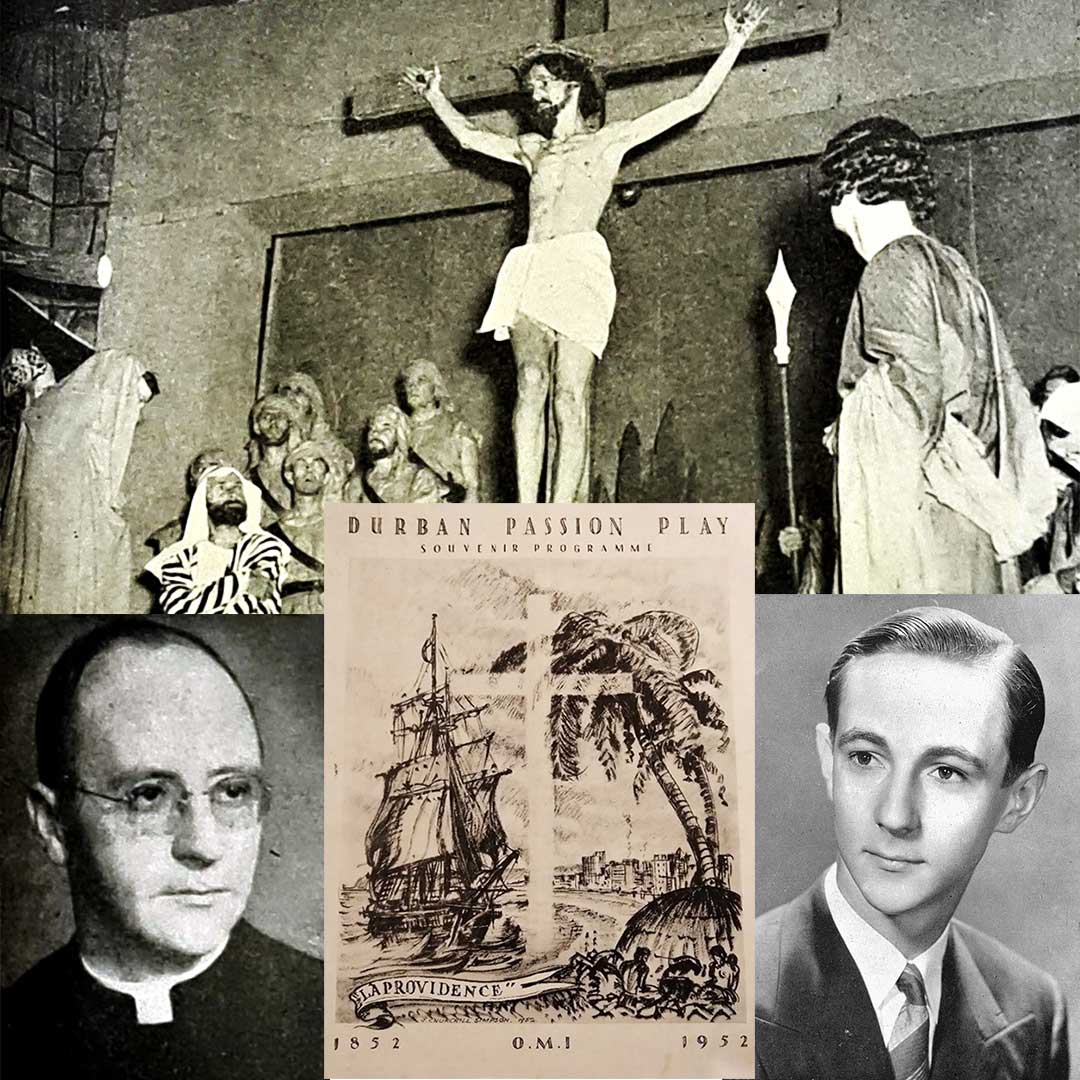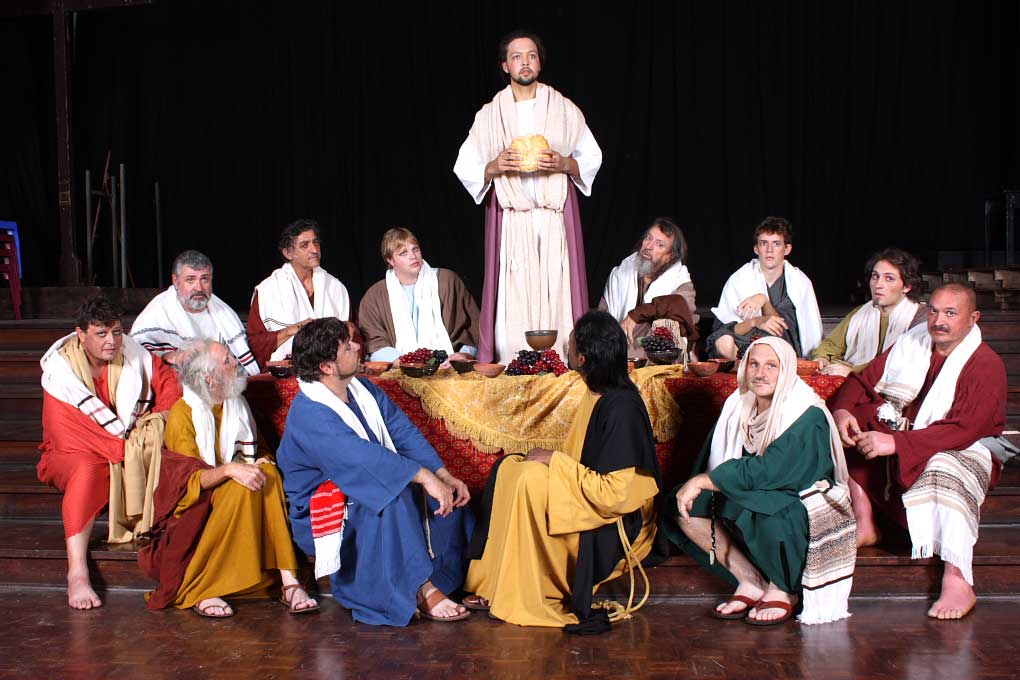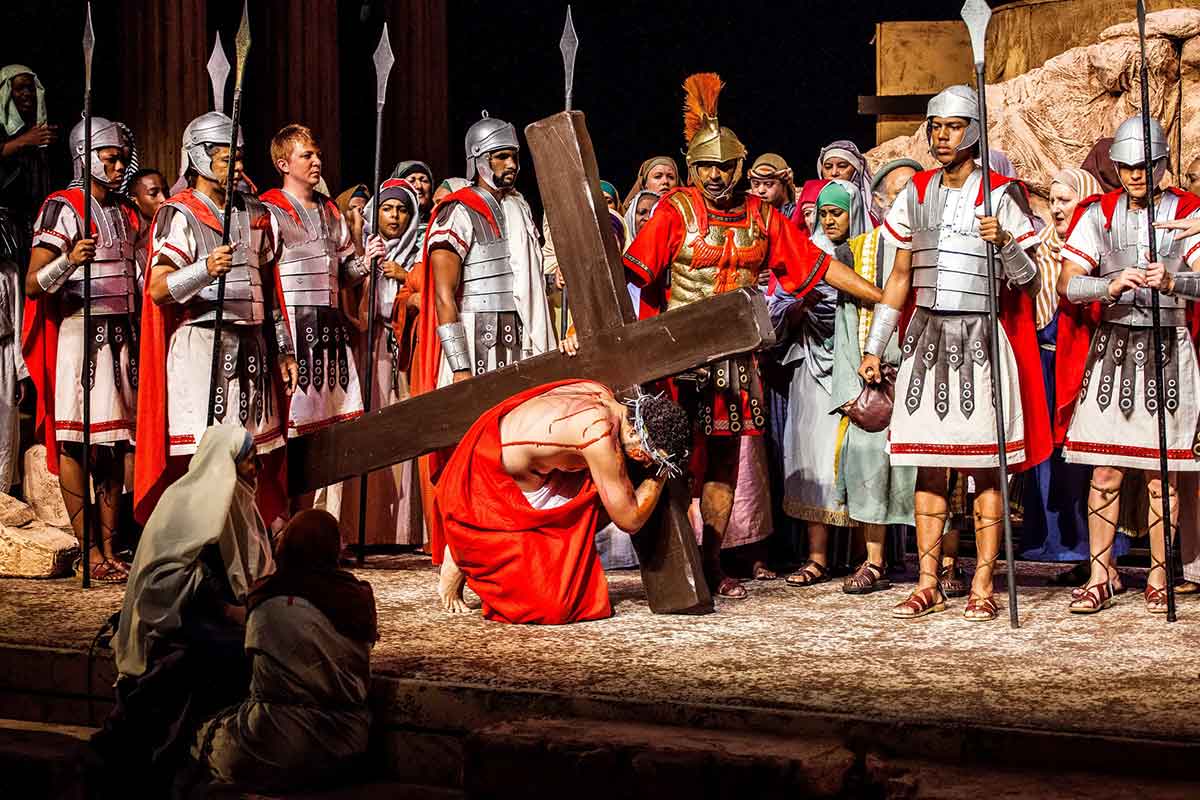The History of the Durban Passion Play

Top: Jesus (David Horner) on the cross in the first production of the Durban Passion Play in 1952. Bottom left: Oblate Father Noel Coughlan OMI, who guided the Durban Passion Play for several decades. Centre: the cover of the programme for the first Play in 1952. Bottom right: David Horner, the first Jesus in 1952.
In April, the Durban Passion Play returned to the stage. Wendy Greef writes about the major moments in the Play’s history.
The Durban Passion Play, which was performed this year from April 6-16 at the city’s Playhouse Drama Theatre, has the unique distinction of being the only one in the world to be affiliated with the world-famous Passion Play of Oberammergau in Germany.
This goes back to 1951, when Archbishop Denis Hurley of Durban obtained special permission from Oberammergau to stage an abridged and adapted version of their Passion Play as a prelude to the National Marian Centenary Congress which was held in Durban in May 1952. The first performance, staged at the Durban City Hall, took place on April 7, 1952, with a final performance at the Greyville Racecourse on May 1. (The story of the genesis of the Passion Play was told in the October 2022 issue of The Southern Cross.)
The first Passion Play was such a success that long-time director Fr Noel Coughlan OMI, who died in 2009 at the age of 94, obtained permission for the Catholics of Durban to produce the Oberammergau Passion Play on a regular basis. Permission was given on the condition that the play would be performed only before non-segregated audiences.

The Last Supper is staged in the 2010 Durban Passion Play. ( Photo courtesy Durban Catholic Players’ Guild)
It was decided that the Durban Passion Play would be performed every five years, an undertaking which the subsequently-formed Durban Catholic Players’ Guild has always taken very seriously. In 1957 the second Durban Passion Play was staged at the Durban City Hall, and further productions were held in 1962 and 1967. Newspaper articles of the time note that performances were routinely sold out, and that many people travelled great distances from throughout Southern Africa to attend every production. The “Oberammergau of Africa” had become a huge success.
1960 saw a Catholic Players Guild delegation travelling to Germany to see the Oberammergau Passion Play. The delegates reported back on the performance they had seen, with photographs they had taken. These sources of information were used to make changes to the script and to other aspects of the 1962 production in Durban, bringing it further in line with the Oberammergau Play.
In 1962 the Guild reciprocated the hospitality of the people of Oberammergau, and welcomed a delegation from the Bavarian village to Durban to see the third production of the Durban Passion Play. It would be the last official contact between Durban and Oberammergau until 1984, when several Guild members attended the 37th German production.
Oberammergau instituted its Passion Play in 1633, as an act of thanksgiving for being spared an outbreak of the plague. It is performed every ten years, with the last being staged, with a two-year delay, in 2022.
Just as the people of Oberammergau annually renew their vow to stage a Passion Play at regular intervals, so do the Durban Catholic Players’ Guild members. They also perform the Way of the Cross on Palm Sunday in non-Passion Play years as well as Carols by Candlelight every year at Mariannhill Monastery. The renewal of the vow ceremony now takes place at Mariannhill after the performance of the Way of the Cross.
Apartheid and the Passion
Inevitably, politics has interfered with the Durban Passion Play. Despite the undertaking given to the people of Oberammergau that performances would take place before non-segregated audiences, apartheid policies made this undertaking very difficult to honour. In 1967, special permissions had to be obtained, resulting in imperfect compromises, and even the German embassy got involved.
Several weeks before the 1972 play began, Archbishop Denis Hurley formally withdrew his longstanding patronage because the apartheid government insisted that all performances be racially segregated. Durban’s archdiocesan Committee on Justice & Peace supported the archbishop’s decision, and on opening night 30 students from the Catholic Society of the University of Natal picketed outside City Hall, handing out pamphlets and carrying banners. Most priests also boycotted opening night. The cast itself was divided when 15 members threatened to join the picket outside the City Hall, and were informed by a member of the directorate that anyone joining would be dismissed from the production.

Jesus falls as he carries his Cross in the 2015 performance. (Photo courtesy Durban Catholic Players’ Guild)
Despite the controversy, the production went ahead, as it was decided that it was better to perform to segregated audiences than to not put on the production at all.
As the Guild prepared for the 1977 production, two years of intensive negotiations finally bore fruit. The government agreed that audiences could henceforth be fully integrated, but it was not until 1986 that Archbishop Hurley resumed his patronage of the Durban Passion Play.
The 1982 production saw another milestone under apartheid: for the first time, people of all races could finally perform together on the stage.
1997 saw the Play move to the Drama Theatre at the Durban Playhouse. A dynamic new set was introduced, which went a long way to facilitating scene changes, thus making productions more professional. This set continues to be used to the present day.
Covid cancels the Play
After the 2015 Passion Play, considerable efforts made by committee members, especially Murray Leyden, resulted in the Guild making contact with the mayor of Oberammergau and with some committee members of their Passion Play production team. Plans were afoot for some Durban Catholic Players’ Guild members to attend the 42nd production of the Oberammergau Play in 2020 (which would be postponed to 2022).
Sadly the 2020 Durban Passion Play will go down in history as the production that didn’t happen. After many months of rehearsing — a combined 135000 hours of preparations — the production was ready to move into The Playhouse. The final rehearsal at Holy Family Convent was followed by a bring-and-share party for cast and production team members. But later that same night, President Cyril Ramaphosa announced that the uncontrollable spread of Covid-19 necessitated the restriction on the number of people who were to be permitted to be together in a closed venue. The size of the cast alone exceeded this number, and the 2020 Passion Play had to be cancelled.
Some people may question the role of Passion Plays in our modern digital age, where video clips online have taken the place of live performances. Others wonder at the tenacity of those who dedicate their time and talents to make every production a success, for no pay. Taking part in the play requires a commitment of at least six months, involving great self-sacrifice.
Perhaps the reason why the Passion Play remains relevant can be found in Fr Coughlan’s commentary in the programme of the 1952 production. He said that the message of the play is that nobly and patiently borne suffering has its meaning and reward in the glory of Eternal Life.
Despite the hard work and self-sacrifice, members of the Durban Catholic Players’ Guild have taken this message to heart. Every time auditions are held, many familiar faces return, often bringing along new family members. By now some families can boast of four generations having been a part of the “Oberammergau of Africa”.
Perhaps what ultimately motivates them can be found in the words of a homily delivered by Fr Coughlan at the Mass said immediately before the first Durban Passion Play performance: “If you can win one soul back to the practice of his or her religion, then you will have that soul’s gratitude. Not just for a while, but through all eternity.”
The Durban Passion Play usually runs for three weeks before Easter, with a final performance on Easter Sunday. Due to renovations at the venue, this year’s dates diverged from that tradition. There are approximately 150 members in the cast, all unpaid amateur actors. In 2015, almost 6000 people attended the performances.
In April, a new cast presented the Passion Play. It was a special occasion as the run also commemorated half a century of the Durban Passion Play being staged.
Published in the March 2023 issue of The Southern Cross magazine
- Newly-Elected Parish Council Chairpersons Meeting in Cape Town - November 12, 2025
- Catholic priest ‘writes what he lives’ in new book on Palestine/Israel - November 11, 2025
- Schoenstatt Shrine Golden Jubilee – Homily by Fr Michael Hagan ISch - November 10, 2025




